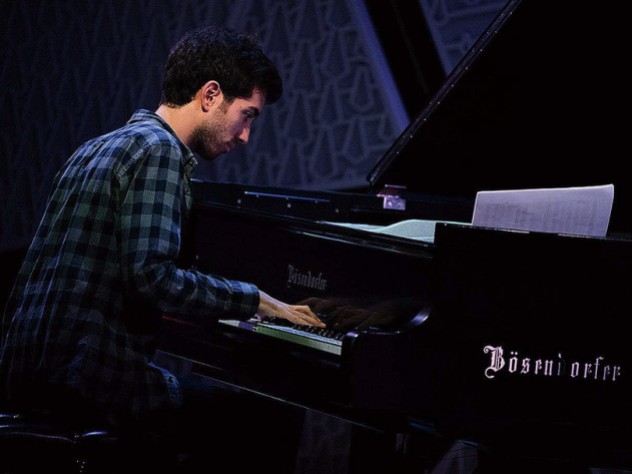Behind the Scenes: Observing Subjects in Their Environments
Nancy Kathryn Walecki reflects on one of her favorite parts about being a journalist; experiencing subjects in their element.
one of the best parts about being a journalist is that you get to watch interesting people in their element. Whether it’s (literally) riding along with the Harvard polo team as they train for a match or watching a world-champion palindromist craft a reversible sentence, reporting means observing (and often participating in) your interview subject’s biggest passion. Witnessing subjects in their environments became more difficult during the pandemic, but as travel and in-person interviews became safe this fall, I had the opportunity to go to New York City and observe the amazing experimental jazz composer Phillip Golub ’16 in action.
I first listened to Golub’s music while writing a different article on the new opera …Iphigenia by Wayne Shorter and professor of practice of music esperanza spalding. With two jazz legends at the helm, the relatively young Golub worked as the show’s musical dramaturg. Once I listened to his own compositions, it was clear why two stars had involved him in their project. His music was so strange, and so exciting. I wanted to meet him—and it turned out that later that month, he was debuting an ambitious project in New York City titled “Filters.”
Sitting down for dinner with Golub outside a Turkish restaurant near his house in Brooklyn, I was reminded how much more generative an in-person interview is as opposed to a remote one. It elicited all sorts of fun details—for example, that his dog coincidentally shared a name with the Turkish restaurant (“Zaytoon,” the Arabic word for “olive”). All of Golub’s engaging quirks were on display: his gesticulations, sure, but also the way he stopped to pet dogs on the street and chat with their owners. The next day, I had the opportunity to see Golub’s four-hour performance, and I took notes and photos so I’d be able to recreate the scene later in my article. I brought along a composer friend for a second set of ears and opinions.
There are few better feelings than getting to devote the time and energy to a story that it requires. And this one did end up requiring a lot of time. I’m a jazz singer, so I thought writing about Golub’s music would be a piece of cake. I quickly realized, however, that my knowledge of the genre was no match for the kind of experimental music Golub was making. To find the right words and points of reference to describe his work, I listened to Golub’s eclectic influences, such as medieval French ars subtilior music, spectral music, and jazz composer Jelly Roll Morton. I also made a few hour-of-need phone calls to my composer friend who let me bounce ideas off him as I tried to write about something as ephemeral as experimental music.
I’m so grateful I had the chance to travel for this piece, thanks to the Magazine’s supporters. Getting to see Golub in action made the piece, and the process of writing it, so much richer. As we have all learned during these past two years, nothing substitutes seeing people in their element, and I’m infinitely grateful I got to do that for this story.
Read “Experimental Magic”

